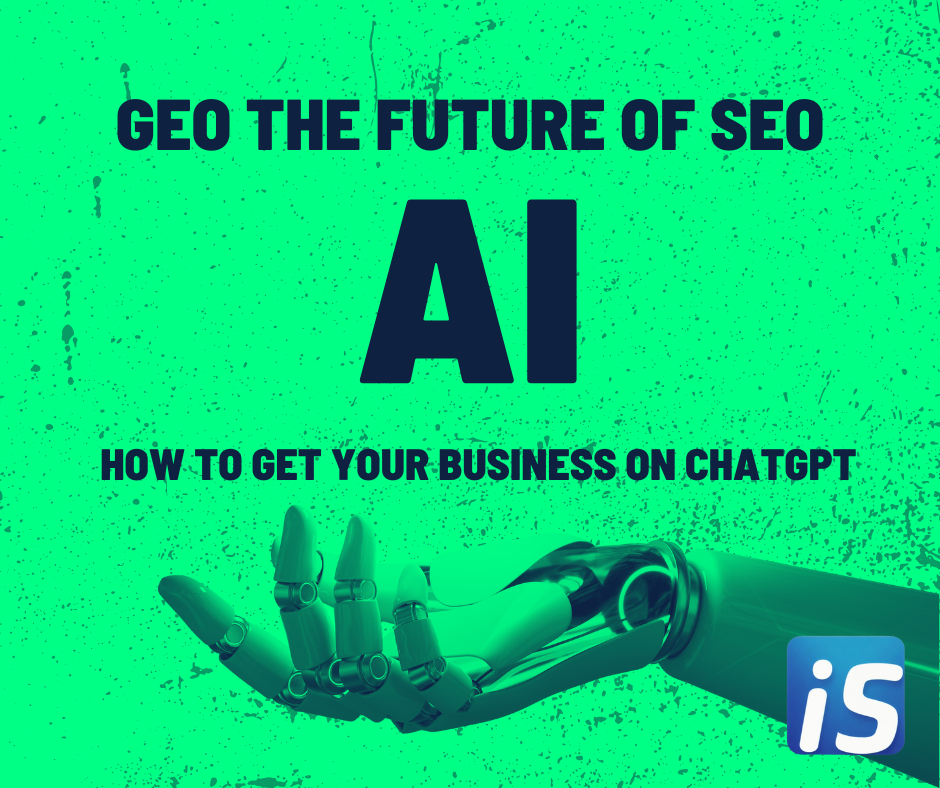
Is it Called GEO? Generative Engine Optimization Explained — How to Get Your Business to Show Up in AI Engines
With the rise of AI-powered tools like ChatGPT and Bard, business visibility has taken a new turn. While many are familiar with SEO (Search Engine Optimization), a new focus on Generative Engine Optimization (GEO) is emerging. Unlike traditional SEO, which caters to search engines like Google, GEO focuses on visibility within generative AI platforms that don’t actively crawl the internet but instead rely on data they’ve learned.
Let’s explore the potential of GEO and how businesses can position themselves to be recognized by AI engines.
What Is Generative Engine Optimization (GEO)?
Generative Engine Optimization (GEO) can be thought of as the process of optimizing your business’s online presence to increase the likelihood that AI-driven tools like ChatGPT, Bing Chat, and others will “know” your business or product. Since these generative AI models rely on training data from various sources (often publicly available data from pre-2021) or curated updates, appearing in this content requires a strategic approach.
In a nutshell, GEO could be viewed as a form of SEO specifically crafted to make your business relevant in the AI-driven world.
How Is GEO Different from Traditional SEO?
While SEO focuses on making your business visible on search engines like Google or Bing, GEO has unique considerations:
- Data Timeframe: Generative AI models are trained on past data, which can be outdated. Updating visibility within these systems often requires getting mentioned in reputable, commonly referenced sources.
- Information Quality and Credibility: AI models prioritize high-quality, widely cited information. Content from reputable sources (news outlets, government or educational sites, etc.) holds more weight.
- Direct Updates to AI Platforms: Some platforms, like ChatGPT Enterprise, may incorporate up-to-date information directly from trusted business sources and plugins.
Steps to Boost Your Business’s Visibility in AI Engines
If you’re interested in having AI models recognize your business, here are some practical steps:
1. Publish High-Quality Content on Authoritative Websites
Creating or contributing articles on high-traffic, authoritative websites helps establish your business within the training data AI models reference. For example, publishing industry insights or thought leadership pieces on credible websites such as Medium, industry journals, or popular news outlets can boost recognition. Since these models prioritize content from trusted sites, focusing on high-authority platforms can improve the likelihood that AI engines recognize your brand.
2. Encourage Mentions in Forums and Social Media
Community-based platforms, such as Reddit, Quora, LinkedIn, and Twitter, are commonly referenced in AI training data. Having real users discuss or mention your business naturally across these channels helps generate a reputation that AI models may recognize. For example, engaging in organic discussions about your product or service in response to common queries can increase visibility over time.
3. Use SEO Best Practices for AI Awareness
SEO principles also apply to GEO. For example:
- Keyword Optimization: Use relevant keywords that people might search for within AI platforms, such as “best [product] alternatives” or “[your service] for small businesses.”
- Structured Data: Structured data, like Schema markup, helps search engines understand your content better. Although not directly influencing AI engines, structured data improves general online visibility.
- Focus on User-Centric Content: AI algorithms are highly tuned to human-like language, so clear, engaging content with relevant keywords increases the chance of positive references within AI training data.
4. Establish a Presence in Knowledge Graphs
Being part of structured knowledge graphs, such as Google’s Knowledge Graph or Bing’s equivalent, can make it more likely that AI models recognize your business. Ensure that your business has a verified Google Business Profile, complete with accurate information, as well as profiles on LinkedIn, Crunchbase, and Wikipedia (if notable enough). These entries help AI models locate structured, factual information about your brand.
5. Partner with Reputable Media and Influencers
Mentions from high-profile influencers, journalists, or publications can increase the chances of your business appearing in AI-powered responses. High-quality backlinks from media articles and influencer content indicate that your business is relevant, credible, and noteworthy.
6. Leverage Direct Integrations Where Available
Some AI platforms now offer plugins or API integrations that allow businesses to directly provide up-to-date information. For instance, if your business has valuable data or insights that can serve AI users, creating a plugin for ChatGPT (using OpenAI’s Plugin tools) can provide direct access to users of that platform. Similarly, integrations through voice assistants like Siri or Alexa can boost accessibility and brand visibility.
Tracking and Measuring GEO Success
Since AI engines don’t have the same direct tracking tools as search engines, assessing GEO success requires a mix of traditional metrics and customer insights:
- Monitor Organic Mentions: Track where your business is mentioned online and the quality of those sources. Tools like Google Alerts, Mention, or Brandwatch help you identify where and how often your brand appears.
- Customer Feedback and Queries: If customers mention they “heard about you on ChatGPT” or similar platforms, take note of these mentions as a sign of successful GEO.
- Website Traffic: Although indirect, a spike in website traffic from channels with good AI optimization could suggest improved recognition within AI-generated recommendations.
The Future of GEO: Why It Matters
With AI engines like ChatGPT and others becoming increasingly popular, Generative Engine Optimization is likely to become a significant extension of traditional SEO. Businesses that adapt early will gain a competitive edge in reaching customers through AI-driven platforms, positioning their brands for greater reach in this new era of search and recommendation.
As we shift toward a world where AI is a central tool for recommendations, GEO offers a fresh approach to standing out. By building your business’s credibility and presence across reputable sources, social platforms, and direct AI integrations, you’re laying the groundwork to appear in future AI-driven searches and responses.
In the age of AI, Generative Engine Optimization might just be the new frontier for businesses wanting to stay ahead.




